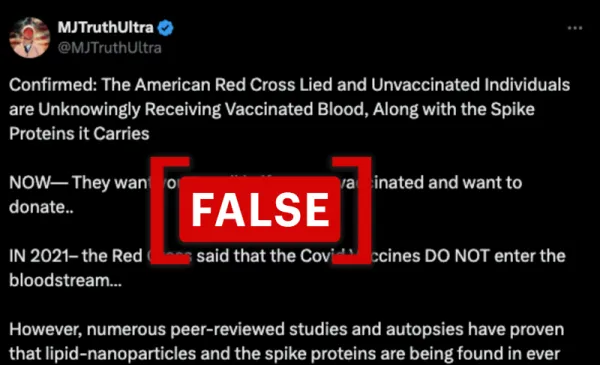By: Naledi Mashishi
March 1 2024
 Source: X/Screenshot
Source: X/Screenshot
It's not possible for vaccinated blood donors to pass on spike proteins created as a result of receiving a COVID-19 vaccine to unvaccinated recipient
Context
In late January 2024, the American Red Cross sent an urgent appeal for blood donations after announcing their fewest donation numbers in 20 years. After some users noted that the Red Cross website asks those who have received COVID-19 vaccinations to call a number to see if they were still eligible for donation, viral claims began circulating questioning the safety of the COVID-19 vaccines.
On 22 February, one user who regularly spreads misinformation to a large online audience posted on X, “[the American Red Cross] want vaxxed blood pumped into the unvaxxed.” Another user posted a similar claim on the same day with more detail, writing, “Unvaccinated Individuals are Unknowingly Receiving Vaccinated Blood, Along with the Spike Proteins it Carries.”
Posts on X making claims about the Red Cross and vaccines. (Source: X/Screenshots/Composite by Logically Facts)
The X post refers to messenger RNA, or mRNA vaccines, which use mRNA created in a laboratory to train the body to make a spike protein typically found on the membrane of the COVID-19 virus. This triggers an immune response, leading the body to create antibodies to fight the foreign protein.
Logically Facts has previously debunked false claims that spike proteins from mRNA vaccines are linked to death and disease, get stuck in the heart where they cause damage, and even a claim that they’ve “completely replaced” sperm in vaccinated men.
However, we found that claims of blood from vaccinated donors passing spike proteins on to unvaccinated recipients are also false.
What we found
On 27 January, the American Red Cross released a joint statement with the Association for the Advancement of Blood and Biotherapies and America’s Blood Centers in an effort to address online misinformation about COVID-19 vaccines and blood donation directly.
The statement says that no components of the COVID-19 vaccine remain in the bloodstream, making it impossible for vaccine components to be transferred from vaccinated to unvaccinated blood recipients.
“There is no scientific evidence that demonstrates adverse outcomes from the transfusions of blood products collected from vaccinated donors and, therefore, no medical reason to distinguish or separate blood donations from individuals who have received a COVID-19 vaccination,” the statement says.
Dr. Katrine Wallace, an epidemiologist and adjunct assistant professor at the University of Illinois School of Public Health, told us there is “absolutely no science” to the claims. “If you give blood from a vaccinated donor to an unvaccinated person, the person receiving the transfusion does not become vaccinated,” she said.
“Your own body makes your antibodies in response to a pathogen like SARS-COV-2 or to your vaccinations. The body does not continually replicate antibodies that are introduced from another person/source.”
She also pointed us to a study published in December 2023 that assessed 18,584 hospitalized patients who received blood both before and after widespread COVID-19 vaccinations. The study found that transfusion of blood from donors who had COVID-19 antibodies from infection or vaccination was not associated with adverse events or negative outcomes in patients with no antibodies.
Neither spike proteins nor any COVID-19 vaccine compounds were transferred to unvaccinated recipients through blood transfusions.
The verdict
Blood donors who have received COVID-19 vaccines cannot pass on any vaccine components, spike proteins, or antibodies to unvaccinated recipients. Studies have shown that there are no adverse effects associated with transferring blood from vaccinated donors to unvaccinated recipients. Therefore, we have rated this claim as false.
The COVID-19 pandemic has given rise to a lot of potentially dangerous misinformation. For reliable advice on COVID-19, including symptoms, prevention, and available treatment, please refer to the World Health Organization or your national healthcare authority.